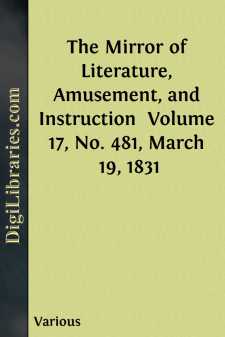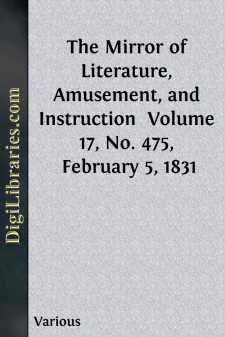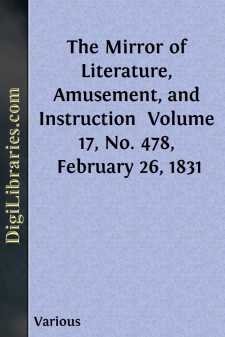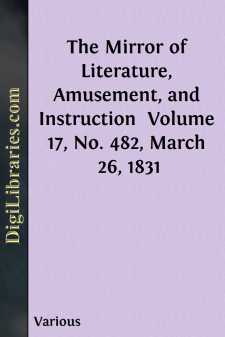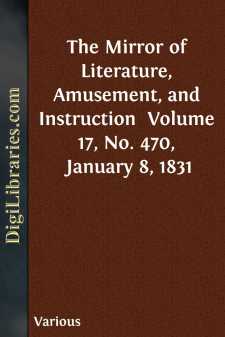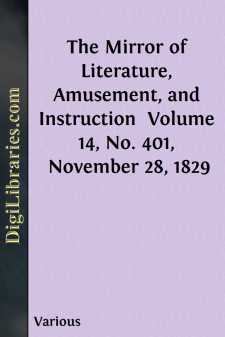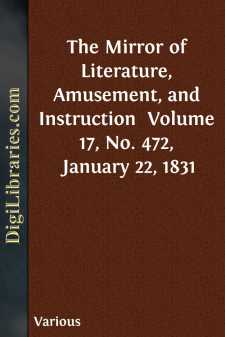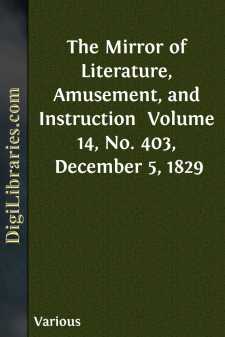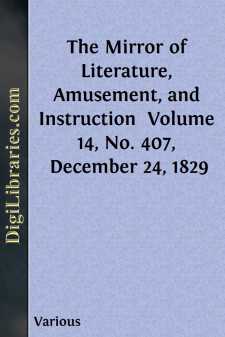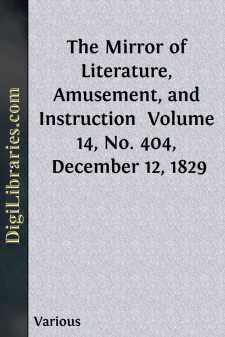Periodicals
- Art 27
- Children's periodicals 59
- Entertainment 5
- Food/Wine 2
- Games/Humor 455
- General
- Health 1
- History 53
- House/Home 1
- Regional 62
- Science/Nature 118
- Transportation 10
General Books
Sort by:
by:
Various
RELICS OF ARIOSTO.INKSTAND.CHAIR.We need not bespeak the reader's interest in these "trivial fond" relics—these consecrated memorials—of one of the most celebrated poets of Italy. They are preserved with reverential care at Ferrara, the poet's favourite residence, though not his birthplace. The Ferrarese, however, claim him "exclusively as their own" Lord Byron, in the...
more...
by:
Various
THE PRINCESS ELIZABETH'S COTTAGE, WINDSOR. They who draw their notions of royal enjoyment from the tinsel of its external trappings, will scarcely believe the above cottage to have been the residence of an English princess. Yet such was the rank of its occupant but a few years since, distant as may be the contrast of courts and cottages, and the natural enjoyment of rural life from the artificial...
more...
by:
Various
AUTOGRAPHS. It is long since our pages were illustrated with such characteristic lineaments as those on the opposite page. The reader will, however, perceive that we have not entirely forgotten the quaint motto from Shenstone, in our earlier volumes— "I want to see Mrs. Jago's handwriting, that I may judge of her temper." Still the annexed Autographs have not been drawn from our own...
more...
by:
Various
BRAY CHURCH. Who has not heard of the Vicar of Bray, and his turning, turning, and turning again? Here is his church, and a goodly tower withal, which we, in our turn, have endeavoured to turn to the illustration of our pages. There is no sinister motive in the selection; but if we have hit the white, or rather the black, of such variableness, "let the galled jade wince," and pay the Mirror the...
more...
by:
Various
Few places in Britain can boast of higher antiquity than the city of Chichester. Its origin is supposed to date back beyond the invasion of Britain by the Romans. It was destroyed towards the close of the fifth century, by Ella, but rebuilt by his son, Cissa, the second king of the South Saxons, who named it after himself, and made it the royal residence and capital of his dominions. Chichester, as may...
more...
by:
Various
The Siamese Twins. The Engraving is an accurate sketch of this extraordinary lusus naturae, which promises to occupy the attention of the whole Town, and has already excited no ordinary curiosity among all ranks of the scientific and sight-loving. Deviations from the usual forms of nature are almost universally offensive; but, in this case, neither the personal appearance of the boys, nor the...
more...
by:
Various
CHRIST CHURCH, DONCASTER. (From the Gentleman's Magazine.) The town of Doncaster has been long celebrated for its beauty and cleanliness, for its striking approach from the south, its magnificent Grand Stand, and celebrated Race Course, its public buildings, its venerable Gothic Church, and stately tower; and latterly, by the erection of a beautiful Gothic Church, with an elegant spire, giving an...
more...
by:
Various
Fall of the Staubbath. In the poet and the philosopher, the lover of the sublime, and the student of the beautiful in art—the contemplation of such a scene as this must awaken ecstatic feelings of admiration and awe. Its effect upon the mere man of the world, whose mind is clogged up with common-places of life, must be overwhelming as the torrent itself; perchance he soon recovers from the...
more...
by:
Various
MEMOIR OF THOMAS CAMPBELL, ESQ. Of the subject of this memoir, it has been remarked, "that he has not, that we know of, written one line, which, dying, he could wish to blot." These few words will better illustrate the fitness of Mr. Campbell's portrait for our volume, than a laudatory memoir of many pages. He has not inaptly been styled the Tyrtaeus of modern English poetry, and one of...
more...
by:
Various
The Royal Observatory, Greenwich. In the present almanack season, as it is technically called, the above illustration of our pages may not be inappropriate or ill-timed, inasmuch as it represents the spot whence all English astronomers make their calculations. The Observatory was built by Charles II., in the year 1675—probably, observes a recent writer, "with no better motive than to imitate...
more...


